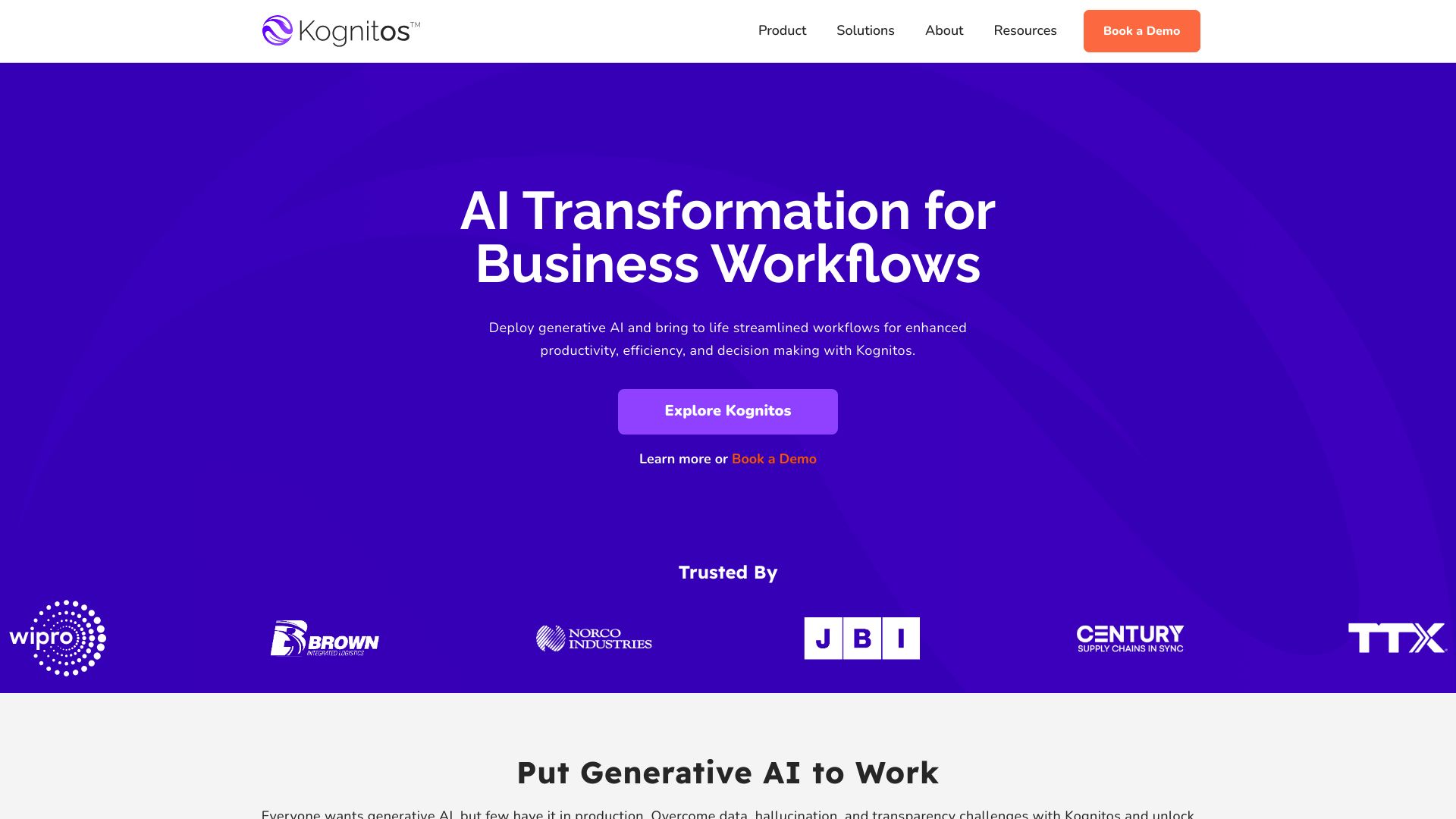AutoGPT vs. Kognitos: AI Agent Platforms Compared
AI agent development platforms AutoGPT vs. Kognitos offer powerful yet distinct approaches to automating complex tasks. While AutoGPT excels in autonomous operations and Kognitos simplifies business process automation, both face challenges in enterprise-grade security and specialized technical applications.
This comparison explores how SmythOS bridges these gaps, providing a comprehensive solution for AI agent creation and deployment. We’ll examine each platform’s unique strengths, limitations, and use cases to help you choose the best fit for your AI development needs, whether you’re a developer seeking powerful APIs, a business leader focused on scalability, or a non-technical user looking for intuitive tools.
AutoGPT Overview
AutoGPT empowers developers to build autonomous AI agents capable of completing complex tasks without constant human input. This open-source platform leverages GPT-4 or GPT-3.5 APIs to create AI agents that can self-prompt, break down large tasks into manageable sub-tasks, and utilize internet resources to achieve user-defined goals.


AutoGPT’s visual builder simplifies AI agent creation through a drag-and-drop interface, enabling users to construct agents without extensive coding knowledge. The platform supports multimodal inputs, processing both text and images, and maintains short-term memory to provide context for subsequent tasks. This combination of features allows for the development of AI agents suited for various applications, from software development to market research and content creation.
AutoGPT empowers developers to build autonomous AI agents capable of completing complex tasks without constant human input.
Despite its advanced capabilities, AutoGPT faces challenges. The platform can be prone to errors due to self-feedback loops and hallucinations. Its recursive nature can lead to high operational costs, and the lack of long-term memory affects performance in extended tasks. Additionally, AutoGPT may occasionally get stuck in infinite loops, requiring human intervention.
Integration capabilities include REST API support and custom plugin development, allowing for extensibility and compatibility with various tools and systems. AutoGPT can be deployed using Docker, enhancing its scalability and portability across different environments. While the platform offers debug mode for issue diagnosis and supports OAuth for authentication, it lacks some enterprise-focused features like data encryption and IP control.
In the competitive landscape of AI agent builders, AutoGPT stands out for its focus on autonomy and its open-source nature. This positions it as a valuable tool for developers and researchers pushing the boundaries of AI capabilities. However, for enterprise users requiring robust security features or non-technical users seeking simpler interfaces, alternative platforms may be more suitable.
Kognitos Overview
Kognitos revolutionizes business automation with its AI-powered platform. The system enables users to create and manage complex workflows using natural language, eliminating the need for extensive coding knowledge. Kognitos integrates generative AI with traditional logic, offering a powerful solution for automating business processes across various industries.


The platform’s standout feature is its ability to understand and execute tasks described in plain English. Users can build automations, handle exceptions, and review logs using everyday language. This approach democratizes automation technology, making it accessible to a wider range of professionals, from business analysts to IT managers.
Kognitos enables users to create and manage complex workflows using natural language, eliminating the need for extensive coding knowledge.
Kognitos differentiates itself from traditional Robotic Process Automation (RPA) solutions by eliminating the need for bot management. The system operates entirely from a browser, utilizing stable API-based automations. This architecture enhances reliability and reduces the maintenance overhead associated with traditional automation tools.
Adaptability sets Kognitos apart in the competitive landscape. The system learns from user interactions, continuously improving its ability to handle exceptions and variations in processes. This self-learning capability makes Kognitos particularly valuable for organizations dealing with dynamic, evolving workflows.
While Kognitos offers impressive capabilities, potential users should consider its limitations. The platform’s reliance on natural language processing may introduce challenges in highly technical or specialized domains where precise, code-level control is required. Additionally, as with any AI-driven system, there may be a learning curve for users to effectively communicate their automation needs in a way the system can interpret accurately.
Feature Comparison
AutoGPT and Kognitos offer contrasting approaches to AI agent development. AutoGPT excels in autonomous task completion, leveraging GPT-4 or GPT-3.5 APIs to create agents that can self-prompt and break down complex tasks. Its visual builder simplifies agent creation, enabling users to construct AI solutions without extensive coding. AutoGPT supports multimodal inputs, processing both text and images, and maintains short-term memory for context in subsequent tasks.
Kognitos, on the other hand, focuses on business process automation using natural language interfaces. It allows users to create and manage workflows using plain English, eliminating the need for coding knowledge. Kognitos integrates generative AI with traditional logic, offering a solution for automating business processes across various industries. Unlike AutoGPT, Kognitos operates entirely from a browser, utilizing stable API-based automations instead of managing bots.
In terms of security and enterprise features, both platforms have gaps. AutoGPT lacks robust data encryption and IP control features, which may concern enterprise users. Kognitos, while offering adaptability and continuous learning from user interactions, may face challenges in highly technical domains where precise, code-level control is required. SmythOS addresses these gaps with advanced security features like data encryption, OAuth integration, and IP control, making it a more comprehensive solution for enterprise-level AI agent development and deployment.
Feature Comparison Table
| AutoGPT | Kognitos | SmythOS | |
|---|---|---|---|
| CORE FEATURES | |||
| Hosted Agents (Dev, Production) | ❌ | ✅ | ✅ |
| Visual Builder | ✅ | ❌ | ✅ |
| Explainability & Transparency | ❌ | ✅ | ✅ |
| Audit Logs for Analytics | ❌ | ✅ | ✅ |
| Agent Work Scheduler | ❌ | ✅ | ✅ |
| SECURITY | |||
| Constrained Alignment | ❌ | ❌ | ✅ |
| IP Control | ❌ | ❌ | ✅ |
| COMPONENTS | |||
| Zapier APIs | ✅ | ❌ | ✅ |
| Data Lakes | ❌ | ❌ | ✅ |
| DEPLOYMENT OPTIONS (EMBODIMENTS) | |||
| Deploy as Webhook | ✅ | ❌ | ✅ |
| Staging Domains | ❌ | ✅ | ✅ |
| Production Domains | ❌ | ✅ | ✅ |
| Deploy as Site Chat | ✅ | ❌ | ✅ |
| Deploy as Scheduled Agent | ❌ | ✅ | ✅ |
| Deploy as GPT | ✅ | ❌ | ✅ |
| DATA LAKE SUPPORT | |||
| Hosted Vector Database | ❌ | ❌ | ✅ |
| Sitemap Crawler | ❌ | ❌ | ✅ |
| YouTube Transcript Crawler | ❌ | ❌ | ✅ |
| URL Crawler | ✅ | ❌ | ✅ |
Best Alternative to AutoGPT and Kognitos
SmythOS stands out as the superior alternative to AutoGPT and Kognitos, offering a comprehensive platform for AI agent development and deployment. We’ve designed SmythOS to address the limitations of other platforms while providing unparalleled flexibility and ease of use.
Our drag-and-drop interface simplifies the creation of complex AI workflows, making advanced AI functionalities accessible to users with varying levels of technical expertise. Unlike AutoGPT’s focus on autonomous task completion or Kognitos’ emphasis on business process automation, SmythOS provides a versatile environment that caters to a wide range of use cases, from chatbots to sophisticated data analysis tools.
SmythOS provides a versatile environment that caters to a wide range of use cases, from chatbots to sophisticated data analysis tools.
SmythOS excels in its extensive integration capabilities. While AutoGPT and Kognitos offer limited integration options, our platform supports a vast array of AI models, APIs, and tools, including popular services like Slack, Trello, and GitHub. This flexibility ensures that SmythOS can adapt to virtually any workflow or business process, providing a significant advantage over its competitors.
Security and scalability set SmythOS apart from both AutoGPT and Kognitos. We’ve implemented robust features such as data encryption, OAuth integration, and IP control, addressing the enterprise-level security concerns that AutoGPT lacks. Additionally, our platform’s scalability supports enterprise-level deployments, allowing businesses to grow their AI solutions without constraints.
With SmythOS, users benefit from a comprehensive suite of deployment options, including APIs, webhooks, scheduled agents, and site chat integrations. This versatility, combined with our platform’s intuitive design and powerful capabilities, makes SmythOS the ideal choice for businesses and developers looking to harness the full potential of AI technology efficiently and effectively.
Conclusion
AutoGPT, Kognitos, and SmythOS each bring unique strengths to the AI agent development landscape. AutoGPT excels in autonomous task completion and multimodal processing, while Kognitos focuses on business process automation using natural language interfaces. However, SmythOS emerges as the superior choice, offering a comprehensive solution that addresses the limitations of both alternatives.
SmythOS’s drag-and-drop interface simplifies AI agent creation, making it accessible to both technical and non-technical users. Our platform’s extensive integration ecosystem, supporting over 300,000 integrations, surpasses the capabilities of AutoGPT and Kognitos. This allows for seamless connection with various data sources, APIs, and AI models, enabling the creation of sophisticated workflows without extensive coding.
Unlike AutoGPT’s challenges with long-term memory and potential for errors, SmythOS offers robust memory management and enhanced reliability. We also address Kognitos’s limitations in highly technical domains by providing advanced features like data encryption, OAuth integration, and IP control, making SmythOS ideal for enterprise-level deployments.
Experience the future of AI agent development with SmythOS. Create a free account to explore our platform’s capabilities, including unlimited agent creation and a risk-free trial. For those ready to revolutionize their workflows, discover our diverse range of AI-powered agent templates to jumpstart your projects. Deploy your AI agents anywhere with our versatile platform and unlock the full potential of AI for your business today.
Last updated:
Disclaimer: The information presented in this article is for general informational purposes only and is provided as is. While we strive to keep the content up-to-date and accurate, we make no representations or warranties of any kind, express or implied, about the completeness, accuracy, reliability, suitability, or availability of the information contained in this article.
Any reliance you place on such information is strictly at your own risk. We reserve the right to make additions, deletions, or modifications to the contents of this article at any time without prior notice.
In no event will we be liable for any loss or damage including without limitation, indirect or consequential loss or damage, or any loss or damage whatsoever arising from loss of data, profits, or any other loss not specified herein arising out of, or in connection with, the use of this article.
Despite our best efforts, this article may contain oversights, errors, or omissions. If you notice any inaccuracies or have concerns about the content, please report them through our content feedback form. Your input helps us maintain the quality and reliability of our information.
